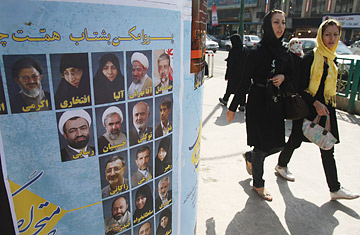
A poster displays conservative candidates running in Iran's parliamentary elections.
She is known as the mother of two shahids, (martyrs) and is sometimes called "commander" by her "sisters." In a neighborhood close to the bazaar district in southern Tehran, Aghdas Moradi, better known as "the mother of Shahid Mohammad Mehdi Abolghasemi," is scurrying around with her black chador flailing around her, giving orders to the men on the other end of her walkie-talkie.
As an activist of the Islamic Alliance Party, perhaps the most hard-line of Iran's conservative factions, she is hard at work running a weekend of programs commemorating the martyrdom of three of the most venerated figures in Shi'ite Islam, the Prophet Muhammad, his grandson Imam Hassan and the only one of Shi'ism's original twelve imams buried in Iran, Imam Reza.
"Turn up the volume," she instructs into her walkie-talkie, "his voice isn't loud enough on the women's side."
The speaker at this evening's event is the cleric Hojjatoleslam Gholamreza Mesbahi-Moghaddam, a candidate of the United Principalists' Coalition (UPC) in Iran's March 14 parliamentary elections. About 700 women, all clad in black chadors, are seated on red carpets in the women's tent, with about the same number of men on the other side.
Everyone is offered tea and dates upon arrival and urged to pick up the UPC's list of 30 candidates for Tehran's share of seats in the Majlis, the national parliament.
Abolghasemi is the leader of 300 basij women, a network of volunteers allied with the Revolutionary Guard and political conservatives. It was the grassroots efforts of groups like hers that helped conservatives take control of the legislature from reformists in 2004, and swept President Ahmadinejad to victory in the 2005 presidential election.
Pointing to a large poster dotted with the portraits of an Islamic Alliance martyrs' genealogy of sorts — men killed in their struggles against the Shah's regime, and in the first post-revolutionary years or the Iran-Iraq war — Abolghasemi says, "That one over there, you see him, fourth row, to the right, that's my son," adding, "He was 17 and never asked his parents for permission to go to the war front. He saw it as his Islamic duty."
A lot of the women are silently reciting the Koran as the candidate-cleric declares, "Our religion is complete, and offers full democracy. We do not need foreign thoughts." The women here say they are happy with Ahmadinejad's government and with the outgoing parliament, in part because there is greater "moral security in society."
When asked about the Western condemnation provoked by some of Ahmadinejad's more controversial statements, 37-year-old Nargess Rezai, a reporter for the party's publication Shoma, responds, "But if you look at the majority of the people in the world, they respect Ahmadinejad for having the courage to express those concerns. He's paved the way for a new dialogue on Israel."
Rallying the electorate against foreign enemies has been an important part of the conservatives' campaigning over the past week, citing the row over the publication of Prophet Muhammad cartoons in Europe, the third round of U.N. sanctions against Iran, and the conflict in Gaza. In a speech, the country's Supreme Leader Ayatollah Ali Khamenei said all those who supported an election boycott — as some reformists whose candidates were barred from running had at first considered to — were "either fooled or supported by foreign interests."
State TV presents Iran, and Islam in general, as being under a concerted assault by the U.S. and its allies. One presenter asks his guest, "In this region, Iran has had the most number of elections in the past 30 years. Why is it constantly accused by the West of lacking democracy?"
On another program, Ahmadinejad asked rhetorically why the U.N. was doing nothing about the killings of "women and children in Gaza," but wasting its time on sanctions against Iran. Coverage of Ahmadinejad moving openly around Baghdad and being feted by the Iraqi government was contrasted with images of President George W. Bush's secret visits to Iraq to suggest that Iran is eclipsing the U.S. in the region. Voting in the election is proclaimed as an Islamic duty, and as "a fist to the mouth of the enemy."
Despite the conservatives' focus on threats from abroad, these elections come at a time of great economic hardship for many Iranians, with double-digit inflation curbing their annual New Year's shopping spree that usually occurs around this time. That has prompted a number of candidates promoting themselves as dard-ashna, a new campaign catch-phrase whose translation vaguely echoes Bill Clinton's 1992 line, "I feel your pain."
Aware that the elections are viewed, in part, as a referendum on the legitimacy of the Islamic Republic, the regime has launched some last-minute policies to woo voters by alleviating financial hardships by, for example, issuing a flush of gold coins and setting price caps on chicken and meat.
The greatest boon to the regime's get-out-the-vote effort, however, may have come from an unlikely quarter: President Bush, who last week expressed the hope that the Iranian people would stay away from the polls. That news is more likely to inflame nationalist passions and swell the turnout. So, while large-scale disqualification of opposition candidates mean that the results won't hold too many surprises, voter turnout still could.
